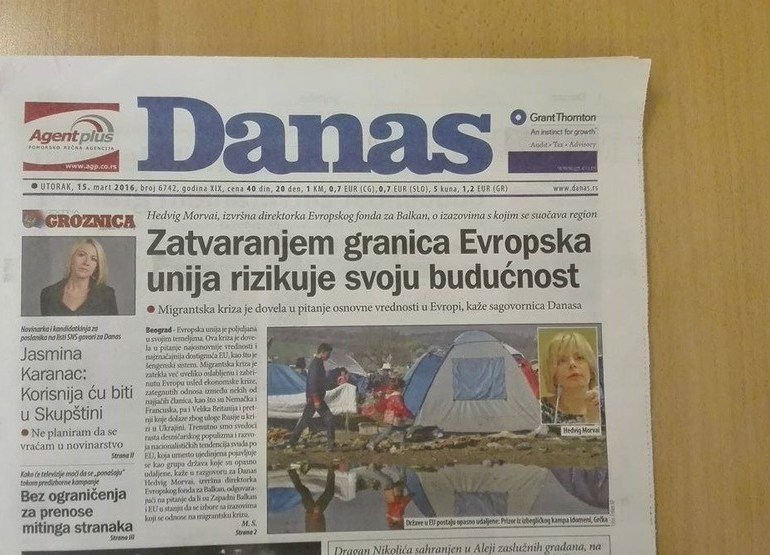
15.03.2016 All News
Hedvig Morvai, The Executive Director of the European Fund for the Balkans, presented her observations on the current challenges of the region, and the EU in the interview that was published on the front page for the Serbian daily newspaper “Danas”.
According to her, EU is risking its future with the recent closure of the borders, since the migrant crisis has managed to deeply shake the system of European values.
“The European Union is shaken in its cornerstones. This crisis is questioning the basic values and objectives of the EU, as the Schengen system. The migrant crisis emerged in a period when EU itself was weakened by its economic crisis, the disputes among the most influential member-states as Germany and France, as well as Britain. Unfortunately, there is no alternative plan for the question of the migrant flow, which can be accepted by all the member-countries.
In regard of Serbia, she agrees that Serbia can become the leading EU “pupil” in the region of the Western Balkans, since it has made great advancement in fulfilling the EU criteria and requests. That is primarily achieved with the Belgrade-Prishtina negotiation, the whole foreign policy of the Serbian Government and the prompt reactions to the migrant crisis.
“But, a necessary precondition is to really work on the strengthening of the institutions, the rule of law and the fight against the corruption with zero tolerance. If the countries of the region are only working on fulfilling the EU conditions, and on the other side the citizens don’t feel any improvements in their lives, the system of corruption gets stronger, and the state is weaker in that respect, than we are faced with the question –“What does being a good EU “pupil” means” – said Morvai.
One of the latest statements of Hedvig Morvai that the region is pretending that is integrating, and that EU is pretending to be enlarged, given in an interview for the N1 Regional TV Network and CNN Affiliate, was transmitted through out the media in Serbia.
“It is more than necessary to think about the current process of EU Integrations, and develop a new dynamic that can seriously move the region forward to the EU membership. Some efforts have been made, but the strategy for the EU Enlargement in the Western Balkans must consider the fact that the promises that were made in Thessaloniki in 2003 have faded, and the challenges that the region is faced with are predetermined by the dynamics of the reforms and the compliance with the EU Standards
The countries from the region should be focused on real and sustainable solutions of the complex problems, which are perceived as serious obstacles for the development and stabilisation of the whole Western Balkans. The general evaluation is that most of them are confronted with the problem of corruption, weak institutions trapped in a net of nepotism and non-transparent decision-making processes that brought to a situation of general mistrust in the political system and less support for the key reforms. The economic crisis, the serious decline of the media freedom and the retrograde developments of the democratic principles are just leading to a process of stagnation and fundamental changes in the process of acquiring the EU Membership status.
The original interview is available at the following link.






